Prior to last Friday’s lovely series finale for Fringe, Joshua Jackson spoke to a group of journalists/bloggers about the finale and the people he with whom he made the show over the last five seasons. It was a touching experience for those of us who got to be on the conference call (most of us being fans of the show from Day One).
Jackson spoke eloquently about the series and the way the cast and crew became a kind of family over that time – as well as what the series’ place in history might be.
I love the show and I’m very sad to see it end.
Joshua Jackson: I’m sad to see it end too, but I hope that we’re going to out with a bang tonight.
I think you will. I’m sure you will. What are you going to miss the most?
Jackson: Well the thing that you end up missing the most actually is not what gets put on the screen. The hardest thing to walk away from over a long-formed TV show is the camaraderie of the company, both the crew and the group of actors that you have together. That’s always the hardest thing to walk away from.
Creatively, I feel like the show came to a natural and satisfactory ending. So I hope that people will be satisfied with the way that we put the story to bed tonight. And I feel like instead of either stretching to show on for too long or having it sort of cut off in an abortive way, I feel like we got to tell the ending of our story. So for that I’m really satisfied, but I will miss the people that I was working with for the last four years.
We know that Walter might need to make the sacrifice in the finale and Olivia … going over there. What is Peter’s role going to be in these final two hours?
Jackson: The first of the two hours really deals with Olivia’s story almost exclusively. It gives us, in a very Fringy way, a finale insight into where she is or has been over the course of this season. So Peter doesn’t really have—in fact, nobody other than really Olivia has much of any role in that story.
But then in the finale, as much as Walter may be called on to make a sacrifice and the gang in general is trying to implement Walter and Donald’s plan, I feel like at least in the script it read pretty fairly spread across all of the players. Everybody has their piece in the story.
And then ultimately Peter’s role, as it has always been, is to be the dutiful son and the husband and father. So that plays itself out in a really specific way. I don’t want to tell you obviously how it plays itself out, but everybody, I think, is pretty engaged in the finale.
I really enjoyed your role and your work in these past five seasons. I really thought it was great. I thought you guys didn’t get nearly the amount of accolades you deserved, but what do you take away from this experience as an actor?
Jackson: As an actor, I don’t know what the takeaway is only one month removed. I can tell you that the thing that is most satisfying to me as an actor is the work that John and I did, ultimately with Jeff Pinkner and Joel Wyman, to try and keep the father/son relationship as honest and as dynamic as we could in the center of this very, very large, crazy science fiction story. So that was always really a point of focus for me.
I think having the chance to be on a serialized TV show and to tell my piece of it, which was the story of the prodigal son who starts off doing everything he can to get out of this world and then eventually gets drawn through the love of his father and then falls in love with a woman and then over the course of the seasons completely reverses his desire to now become a really dedicated son and a solid and reliable boyfriend and then husband and then a crazily protective father. I think that’s an interesting journey to go on.
And I think that Walter’s and Peter’s story mirroring each other so distinctly in the fifth season is an interesting thing. So for me, an audience member is always most engaged by serialized story telling, so I guess as an actor the thing that I take away from it is how much fun it is to perform a serialized story.
Last season actually really felt like sort of the closure, and it was, I think the closure of the overarching storylines where Peter had momentarily left kind of that domestic role in the show and became kind of a savior figure. Now it’s interesting in this postscript season; that’s kind of been rewritten. The boy who must live was not Peter and he’s come back to being in this primarily domestic role, which is what he was in, in the beginning. I wanted to know your take on that and if you were involved in any conversations about what you said you’re playing out in this final season, which is a father, a husband, a son, if that’s satisfying to you and if you were sort of part of that conversation?
Jackson: To a greater extent than at any time in the prior seasons of the show I was involved in the initial conversations about what season five would be. Wyman was incredibly open this year, not just with myself but I think with all of the actors, about what their characters would be and what their final arcs would be.
He gave, I think, all of us this signpost of what our season would be in a way that hadn’t happened before. So he gave us all of the opportunity to plot out exactly how we thought we should be playing each of our individual characters. So from that standpoint it was actually tremendously satisfying.
I actually felt like Peter got a really—the Peter as Observer arc I thought was quite interesting this year and I thought that the—always to me what was interesting about Fringe was that even though the larger story was as big as it can possibly be, the saving universes and doppelgangers and all the rest of it, the beating heart of the story was always the family tale.
I really enjoyed the fact that at the center of what was driving Peter and Olivia this year was both the recovery and then the loss of their child, and then as a couple trying to grapple with that both individually and together. So I think we did a really good job this year of having the larger story driving forward but having the smaller interpersonal story be honest.
And then as always, Peter and Walter, they’re just inextricably linked. So Peter mirrored all of the mistakes that his father had made all those years ago regarding Peter, in regards to his own daughter. So yes, I felt it was a very satisfying story and a proper for our show to end when you see the finale to night.
Going back a little bit to what you were talking about with the Observer arc, you finally got to kind of an alt version of Peter. When you were working with Joel to kind of track where you wanted to go was that something you actively wanted your opportunity to do? And then how did you kind of prepare for that or kind of become one? Were you doing a lot of research on what Michael has done or were you just watching the other—?
Jackson: I was never too concerned about doing an “alt version.” As much fun as it seemed like for the people who had done it, it wasn’t something that I felt was necessary for me to do to feel like I’d been a part of Fringe. What was more important to me was to find what would be an honest and satisfying story and then conclusion to the story for the Bishop family.
Neither Wyman or myself were interested in having another season of Peter and Olivia ‘will they or won’t they?’ So it was more interesting to have them be still a couple, still a married unit but that was deeply, deeply damaged by the loss of their child, and to have Peter mirror the mistakes that Walter had made.
Becoming an Observer portion of it was just a natural outcropping of—Walter’s great sin was breaking the universe to save his child because there was no place that too far for him to go. And in the version of the story that we were telling, the most outrageous thing that Peter could do would be to become the enemy to destroy him.
So I thought that was actually a fairly outcropping and also gave Peter and Olivia an interesting arc to their story as they tried to figure out how to be together again instead of being sort of alone together, to try and figure out how to make their marriage tick again with the loss of their child.
I was just wondering real quick if you took anything from the set as a memento to remember the series.
Jackson: People ask me that all the time and I don’t know; maybe I’m just not very imaginative, but it didn’t even cross my mind while I was there. So the answer sadly is no.
How do you feel about the way Fringe engaged its audience in today’s world that makes it easy for people to disengage?
Jackson: I think in the true way of popular media some of it was intentional. I know from the very beginning with the Observers and with the glyphs, Bad Robot wanted to put sort of a second layer beyond just observing the show, just watching the show, and I know that Fox was really keen on that too as a way to sort of deepen people’s experience of Fringe. And the audience took that and ran with it in a way that I don’t think—I think that went beyond the wildest imaginations of anybody who was engaged in the beginning.
As much as every TV show is trying to reach out to its audience, it really is the audience itself in our case who continued to drive their own interest and continued to keep each other engaged. As much as we tried to help them along, the community of Fringe became totally self-supporting, and I think that’s actually one of the more—
If you talk about Fringe, not just as a narrative experience on screen, I think one of the more interesting things that’s come out of it is the community built around the show and how powerful that can be in tipping the scales towards the show surviving or failing. Because by traditional metrics our show would’ve been off the air at least last year but probably two years ago, except the passion of our fan base made it impossible for our show to be dismissed. Maybe the way that even ten years ago science fiction shows quite often were lost. So I think the fan base and the passion of the fan base is a large part of the story of the show Fringe.
You’ve been through a major season finale before with Dawson’s Creek. And while Fringe is admittedly a very different show it seems to have no less of an emotional impact with its fans. Coming to this finale as now an older actor with more experience, more life experience, how would you compare the two experiences that you’ve had with these finales?
Jackson: There is oddly a lot of similarities. Clearly I am a decade, maybe even more, older now than I was when we finished Dawson’s, but I’ve had now the good luck on both of the TV shows that I’ve worked on, we’ve known going into the last season that it was the last season. So it gives you an opportunity on set to properly say goodbye to the people that you’re working with.
It also has a really good way of sort of focusing the mind on trying to make sure that no matter how hard it is, no matter how tired you are, that you give everything that you have to those last shows because there is no tomorrow. You want to make sure that you go out on the highest note possible. So the feeling on set both times was quite similar. There’s an almost carnival like feeling as you get towards the end of this huge exchange in anybody’s life. It’s a very cathartic thing.
And at the very end you look around at this group of people who you’ve spent 70 hours a week with for nine months out of the year for the last four or five years and you have a chance to just take stock and go, ‘My God, I can’t believe that we did this.’ And creatively, because you know it’s the end, you have the opportunity to finish it on your own terms, which is not often the case in television.
The differences are that Dawson’s Creek was never—I wasn’t a fan of 90210 – it wasn’t particularly my genre of show. Fringe, on the other hand, is right up my alley. So I have probably more of a personal stake in the climax of this show, in making sure that it is the satisfactory end to the journey that the audience has been on. So I hope we achieve that tonight.
I was just wondering now that everything’s over if you have a personal favorite episode, either as an actor or as a viewer, looking back?
Jackson: I’ve been asked that question before, and I have a couple of pat answers, but the truth is there’s no specific episode that would jump out to me because the experience of making the show is so different from the experience of watching the show. So the things that I will really take from the experience are not specific episodes or even specific scenes but storylines or great days at work. The thing that is probably the most cherished piece of the experience to me is the ability to have this long-formed story with John Noble and the work that we did to try and make that father and son dynamic work.
Earlier I asked you about the fan interaction with the show. This is one of those shows that have been critically acclaimed but not always achieved the viewership you would have liked to have seen. Those are the types of shows that kind of take on a life of their own after they go off the air. I’m thinking of Star Trek and Firefly, Arrested Development. What do you see in the future? How will Fringe be viewed in this respect? What will be its legacy in television history? Do you see a movie down road? Where do you see its future?
Jackson: This is a topic that you and I could talk about probably for a couple of hours because I find this really fascinating, but I’ll give you a brief version of my answer to that. I feel like Fringe and its afterlife is a test case for the new way that television works, because the two shows that you mentioned, Firefly and then Star Trek obviously is the granddaddy of them all.
Part of what made that audience so passionate was scarcity. It was hard to, less so for Firefly, particularly for Star Trek, but it still existed. It was hard for the fans, the community of those shows, to find them, talk about them, disseminate them because as hard as it is for us to remember, Firefly was not at the very beginning but long before this sort of ubiquitous nature of the Internet and fan forums and things like that.
So Fringe, in an odd way, started its afterlife while it was still on the air. The community of the show is currently strong and vibrant and I have a funny feeling that the afterlife of the show, as much as we who have been making it for the last five years are finishing our portion of it, I think it will live on in that community.
And how that manifests itself? I don’t know. Perhaps there would be a movie. I think there will probably be a lot of fan fiction. Maybe there will be even some sort of filmed addendum to the show or televised or podcasts or however it manifests itself, but I feel like the afterlife of Fringe is the test case for how modern cult shows are going to live on after they go off the air.
I’ve been a big fan of the show, watched every episode from the beginning and all that. Actually I watched it mainly because of you, because I had watched Dawson’s Creek but I am also a science fiction fan. It was interesting what the previous caller said and what you said about them being two very different shows, I believe the term was. I was wondering if you don’t think that they have some very important things in common, like you said.
They’re both serialized dramas and I what I found about Fringe was that it was very romantic, especially the last few years. Especially what comes to mind is when Olivia finally remembers Peter. To me that the most romantic thing I’ve ever seen in any TV show ever. Your thoughts on the two shows, comparing the two shows?
Jackson: Truthfully, any two good character-based shows or any ten good character-based shows will have a lot of things in common because the humans, if they’re honest, go through the same things. That was always what was most interesting to me, not even just about Fringe, but about all science fiction is that you’re using a broad canvas to relay stories that are very human in their nature and maybe give yourself the opportunity to attack those problems in novel ways because of the broad canvas.
However, a healthy life has romance in it and it has heartbreak in it. So the themes, those themes of personal growth and discovery, which were very much what Dawson’s was all about in a more direct and literal sense, of course those were central to Fringe as well.
For Olivia, this emotionally disconnected, broken woman to find a way to be able to trust and allow herself to have the strength, the courage to fall in love, even against all odds, to have her heart broken but still remain emotionally available enough to have a child with a man; for Peter to get over his anger to his father, towards his father, essentially to fall in love with his own father and to forgive him and to become part of a family, those are universal themes that I think—of course you’re absolutely right.
There are definite thematic similarities between Dawson’s Creek and Fringe, but also would be between really any good character based show where you’re getting into the personal lives of the people that you’re watching.
Obviously you’ve talked about hopefully, we all hope, this show will live on in whatever way. Obviously their journeys aren’t over. Can you say, is there any specifically—like what would you like to see in the future happen to Peter, like his ultimate ending? What would you like to see happen if you wrote it?
Jackson: I think the proper ending for the Peter that we’ve known on screen for the last five years actually happens tonight in the finale. I love the ending. I think it makes really good sense and it wraps up his story in a way that is of course intertwined with all of the characters around him but really specifically intertwined with Olivia and with Walter and with Eta.
I think it is a proper ending to the person and the story that we’ve been watching for the last five years. I feel that way, truthfully, for all of the big three, for Olivia, Walter and Peter. I think Olivia and Peter end in a proper space. Olivia, Peter and Walter end in a proper space, and Peter and Walter get to the place that they need to be. So I think for our story it ends tonight.
But the beauty of what Wyman’s done is that he—well, I can’t really answer that. He allows the space for people to live on with these characters should they desire to. I know that’s a pretty fuzzy answer, but I don’t want to give away any of the plot details of the finale tonight.
I had a question about over the past couple of episodes, before tonight’s season finale, we saw Walter sort of in a desperation thinking that because the pieces of his brain had been put together that he was going to turn into this mad scientist that he always was or was before in the past.
And then when we see in the episode The Boy Must Live or the episode prior, Michael, the kid Observer, touches Walter and then in The Boy Must Live he has this new lease on life but then finds out from Donald that the plan all along was for him to die and to send the boy into the future. Would it be fair to say that Peter would—I have no idea what’s going to go on tonight—give his life for Walter, if that was the choice?
Jackson: Peter has already given his life for Walter. The end of the storyline of Peter and the Machine was Peter choosing for his family to live and he to cease existing himself. Peter to cease existing. So yes, I think it would not at all be outside of Peter’s thought process to sacrifice himself for a family member, it just is a question of which family member he would sacrifice himself for. Again, it’s really hard for me to talk about—
The journey of Walter’s crisis of conscious, as much as he’s worried that he’s going to become—the price of his genius has been hubris and that hubris has been incredibly destructive, and so Walter is essentially afraid of becoming fully Walter because he’s not sure that he cannot become that egomaniac again.
I think the gift that Michael gives him, this impasse, is to free him from that fear, to release him from the small mindedness of thinking that there has to be some sort of price to pay for being the best version of himself that he can be. I think that’s what gives Walter his new lease on life. I think it’s also what gives Nina Sharp the ability to accept her fate towards the end of her episode.
I think there are a lot of different themes going on. Of course I don’t want to give away what’s about to happen tonight, but I do feel like there’s a really emotionally honest and satisfying conclusion, or resolution I should say, to that question of family sacrifice tonight.
Moderator: Josh, do you have any closing comments?
Jackson: I do. I just would like to say to everybody involved here tonight and to everybody who has come on this journey for these five years of this show, it is—and I’m going to speak out of turn here, because they’re not all represented, but we collectively, as a group, as a cast, as a crew, as writers, are so thankful to the support that we have been given over these years and have been often in awe of the passion that people have felt for this show.
So I personally, and I know we collectively, hope that we finish this season and ultimately this series on a positive note tonight that is satisfying to the people who have given us so much over the course of the five years. So thank you to everybody for listening today and if you could pass on my and our great thanks to everybody who has come with us on this journey. I’ll talk to you on the next one I guess.
Photos by Liane Hentscher/Courtesy Fox Television
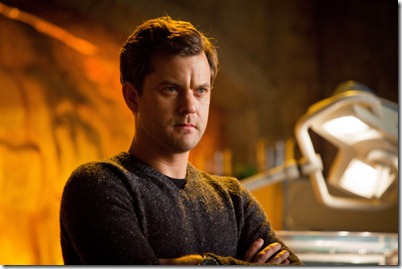
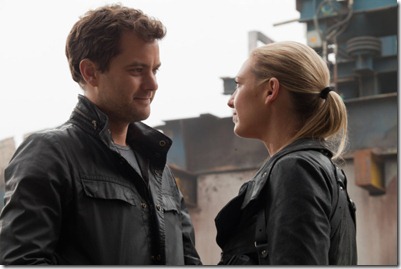
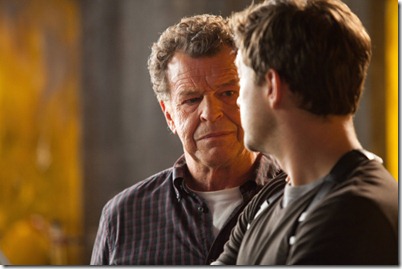
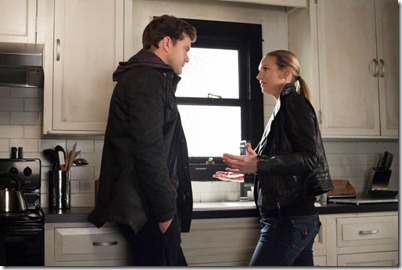
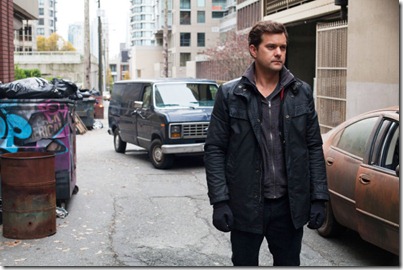
Walter’s plight is the same plight we all face; the fear that we cannot become the person we have idealized in our minds. There is a personal aspect to this show that anyone can relate to because we all have undesirable characteristics, and that’s what makes the interpersonal dynamics so compelling. I recorded all of the last season as I watched it with my DISH coworker. I can watch it again later this year because my DISH Hopper HD DVR has a 2000 hour recording capacity, which lets me save a lot of series. It saves me money over having to buy the DVDs, so it’s kind of like having my own digital library that doesn’t require a whole room of shelves.